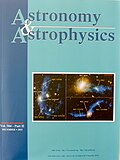Astronomy is a natural science that studies celestial objects and the phenomena that occur in the cosmos. It uses mathematics, physics, and chemistry...
98 KB (10,186 words) - 18:32, 1 September 2024
of astronomy focuses on the contributions civilizations have made to further their understanding of the universe beyond earth's atmosphere. Astronomy is...
84 KB (10,298 words) - 07:13, 8 November 2024
In astronomy, an epoch or reference epoch is a moment in time used as a reference point for some time-varying astronomical quantity. It is useful for...
24 KB (3,437 words) - 09:50, 14 July 2024
Astronomy & Astrophysics (A&A) is a monthly peer-reviewed scientific journal covering theoretical, observational, and instrumental astronomy and astrophysics...
22 KB (2,166 words) - 01:55, 16 October 2024
Radio astronomy is a subfield of astronomy that studies celestial objects at radio frequencies. The first detection of radio waves from an astronomical...
37 KB (3,879 words) - 09:55, 6 October 2024
Amateur astronomy is a hobby where participants enjoy observing or imaging celestial objects in the sky using the unaided eye, binoculars, or telescopes...
30 KB (3,445 words) - 15:30, 12 October 2024
Babylonian astronomy was the study or recording of celestial objects during the early history of Mesopotamia. The numeral system used, sexagesimal, was...
30 KB (3,707 words) - 04:37, 7 October 2024
Sun (redirect from Sun (astronomy))
Unsolved problem in astronomy: Why is the Sun's corona so much hotter than the Sun's surface? (more unsolved problems in astronomy) The temperature of...
165 KB (18,120 words) - 05:41, 2 November 2024
of astronomy is a list of definitions of terms and concepts relevant to astronomy and cosmology, their sub-disciplines, and related fields. Astronomy is...
161 KB (18,470 words) - 08:08, 9 October 2024
Abell clusters. The new redshift surveys revolutionized the field of astronomy by adding depth to the two-dimensional maps of cosmological structure...
37 KB (4,466 words) - 16:28, 2 November 2024








